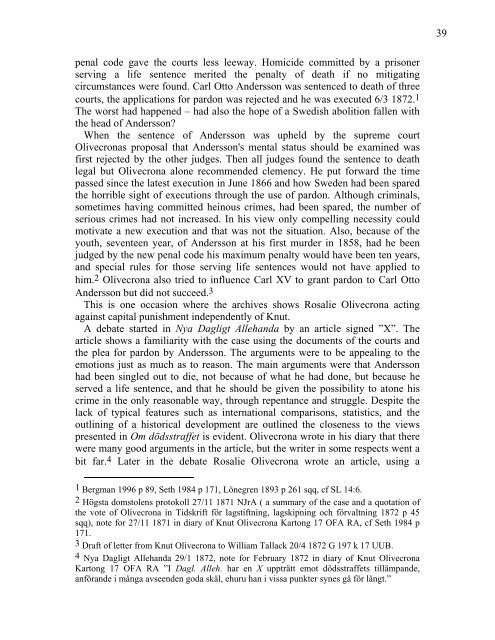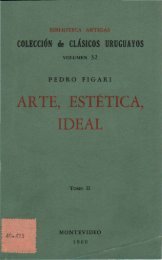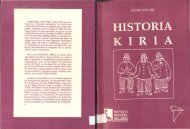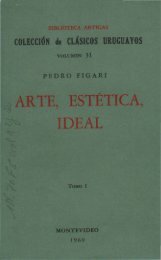Knut Olivecrona and his ”Om dödsstraffet”. - Figuras
Knut Olivecrona and his ”Om dödsstraffet”. - Figuras
Knut Olivecrona and his ”Om dödsstraffet”. - Figuras
You also want an ePaper? Increase the reach of your titles
YUMPU automatically turns print PDFs into web optimized ePapers that Google loves.
penal code gave the courts less leeway. Homicide committed by a prisoner<br />
serving a life sentence merited the penalty of death if no mitigating<br />
circumstances were found. Carl Otto Andersson was sentenced to death of three<br />
courts, the applications for pardon was rejected <strong>and</strong> he was executed 6/3 1872.1<br />
The worst had happened – had also the hope of a Swedish abolition fallen with<br />
the head of Andersson?<br />
When the sentence of Andersson was upheld by the supreme court<br />
<strong>Olivecrona</strong>s proposal that Andersson's mental status should be examined was<br />
first rejected by the other judges. Then all judges found the sentence to death<br />
legal but <strong>Olivecrona</strong> alone recommended clemency. He put forward the time<br />
passed since the latest execution in June 1866 <strong>and</strong> how Sweden had been spared<br />
the horrible sight of executions through the use of pardon. Although criminals,<br />
sometimes having committed heinous crimes, had been spared, the number of<br />
serious crimes had not increased. In <strong>his</strong> view only compelling necessity could<br />
motivate a new execution <strong>and</strong> that was not the situation. Also, because of the<br />
youth, seventeen year, of Andersson at <strong>his</strong> first murder in 1858, had he been<br />
judged by the new penal code <strong>his</strong> maximum penalty would have been ten years,<br />
<strong>and</strong> special rules for those serving life sentences would not have applied to<br />
him.2 <strong>Olivecrona</strong> also tried to influence Carl XV to grant pardon to Carl Otto<br />
Andersson but did not succeed. 3<br />
T<strong>his</strong> is one occasion where the archives shows Rosalie <strong>Olivecrona</strong> acting<br />
against capital punishment independently of <strong>Knut</strong>.<br />
A debate started in Nya Dagligt Alleh<strong>and</strong>a by an article signed ”X”. The<br />
article shows a familiarity with the case using the documents of the courts <strong>and</strong><br />
the plea for pardon by Andersson. The arguments were to be appealing to the<br />
emotions just as much as to reason. The main arguments were that Andersson<br />
had been singled out to die, not because of what he had done, but because he<br />
served a life sentence, <strong>and</strong> that he should be given the possibility to atone <strong>his</strong><br />
crime in the only reasonable way, through repentance <strong>and</strong> struggle. Despite the<br />
lack of typical features such as international comparisons, statistics, <strong>and</strong> the<br />
outlining of a <strong>his</strong>torical development are outlined the closeness to the views<br />
presented in Om dödsstraffet is evident. <strong>Olivecrona</strong> wrote in <strong>his</strong> diary that there<br />
were many good arguments in the article, but the writer in some respects went a<br />
bit far.4 Later in the debate Rosalie <strong>Olivecrona</strong> wrote an article, using a<br />
1 Bergman 1996 p 89, Seth 1984 p 171, Lönegren 1893 p 261 sqq, cf SL 14:6.<br />
2 Högsta domstolens protokoll 27/11 1871 NJrA ( a summary of the case <strong>and</strong> a quotation of<br />
the vote of <strong>Olivecrona</strong> in Tidskrift för lagstiftning, lagskipning och förvaltning 1872 p 45<br />
sqq), note for 27/11 1871 in diary of <strong>Knut</strong> <strong>Olivecrona</strong> Kartong 17 OFA RA, cf Seth 1984 p<br />
171.<br />
3 Draft of letter from <strong>Knut</strong> <strong>Olivecrona</strong> to William Tallack 20/4 1872 G 197 k 17 UUB.<br />
4 Nya Dagligt Alleh<strong>and</strong>a 29/1 1872, note for February 1872 in diary of <strong>Knut</strong> <strong>Olivecrona</strong><br />
Kartong 17 OFA RA ”I Dagl. Alleh. har en X uppträtt emot dödsstraffets tillämp<strong>and</strong>e,<br />
anför<strong>and</strong>e i många avseenden goda skäl, ehuru han i vissa punkter synes gå för långt.”<br />
39






